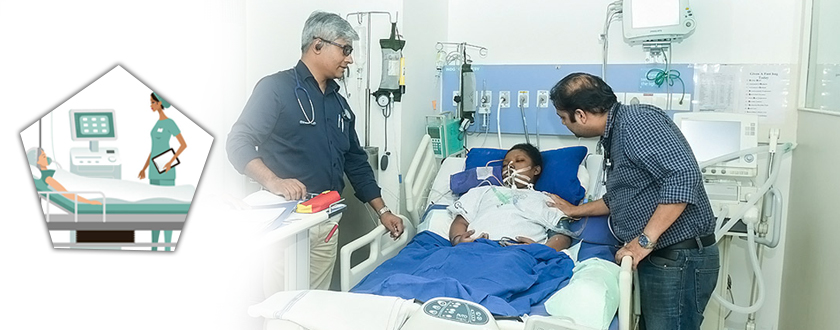24hrs Emergency & Critical care Centre
- 24hrs Emergency & Critical care Centre
- 24hrs Accident & Trauma Care Centre
- 24hrs Ambulance Service & Poison Care Management
- 24hrs Hi tech Pharmacy
- 24hrs Management.php
- Advance HD Laparoscopic Unit
- Advanced 4D USG scan
- Advanced Dental Clinic & Orthodontic Specialty Clinic
- ECG/EMG/EEG/TMT/ Sleep Study & Multi monitoring Facilities
- Fully equipped Modern Operation Theatres (with C-arm & Workstation)
- Hi-tech Bio-chem / Hematology Lab
- Intensive Cardiac care (24hrs ICU/CCU)
- Intensive Neuro Care Unit
- Intensive Respiratory Care Unit With (IRCU) of Adult, Pediatric & Neonatal Ventilators
- Physiotherapy

24hrs Emergency & Critical care Centre
The Emergency Department (ED) at our hospital provides 24 hour, urgent care to patients who have traumatic injury, major illnesses or other issues that require immediate treatment. The staff includes physicians, nurses and other healthcare professionals who follow specific procedures so that you can get the care you need as quickly as possible.
Triage is an advanced skill; emergency nurses spend many hours learning to classify different illnesses and injuries to ensure that patients most in need of care do not wait to receive it. Protocols are followed to initiate laboratory or x-ray studies from the triage area while the patient waits for a bed in the ED. Collaborative protocols are developed and used by the triage nurse based on his or her level of experience. Also, nurses in the triage area collect crucial initial data: vital signs and history, neurologic assessment findings, and diagnostic data if necessary.
For the patient with an emergent or urgent health problem, stabilization, provision of critical treatments, and prompt transfer to the appropriate setting (intensive care unit, operating room, general care unit) are the priorities of our emergency care. Although treatment is initiated in the ED, ongoing definitive treatment of the underlying problem is provided in other settings, and our belief is that the sooner the patient is stabilized and moved to that area, the better.
CRITICAL CARE UNIT
Critical care is medical care we offer for people who have life-threatening injuries and illnesses. A team of specially-trained health care providers gives you 24-hour care. This includes using machines to constantly monitor your vital signs. It also usually involves giving you specialized treatments.
Our doctors at this Unit give critical care if you have a life-threatening illness or injury, such as
- Severe burns
- Heart attack
- Heart failure
- Kidney failure
- recovering from certain major surgeries
- Respiratory failure
- Sepsis
- Severe bleeding
- Serious infections
- Serious injuries, such as from car crashes, falls, and shootings
- Shock
- Stroke
In our critical care unit, health care providers use lots of different equipment, including
- Catheters, flexible tubes used to get fluids into the body or to drain fluids from the body
- Dialysis machines ("artificial kidneys") for people with kidney failure
- Feeding tubes, which give you nutritional support
- Intravenous (IV) tubes to give you fluids and medicines
- Machines which check your vital signs and display them on monitors
- Oxygen therapy to give you extra oxygen to breathe in
- Tracheostomy tubes, which are breathing tubes. The tube is placed in a surgically made hole that goes through the front of the neck and into the windpipe.
- Ventilators (breathing machines), which move air in and out of your lungs. This is for people who have respiratory failure.
A systematic approach is followed to effectively establish and treat health priorities where the primary survey focuses on stabilizing life-threatening conditions.
